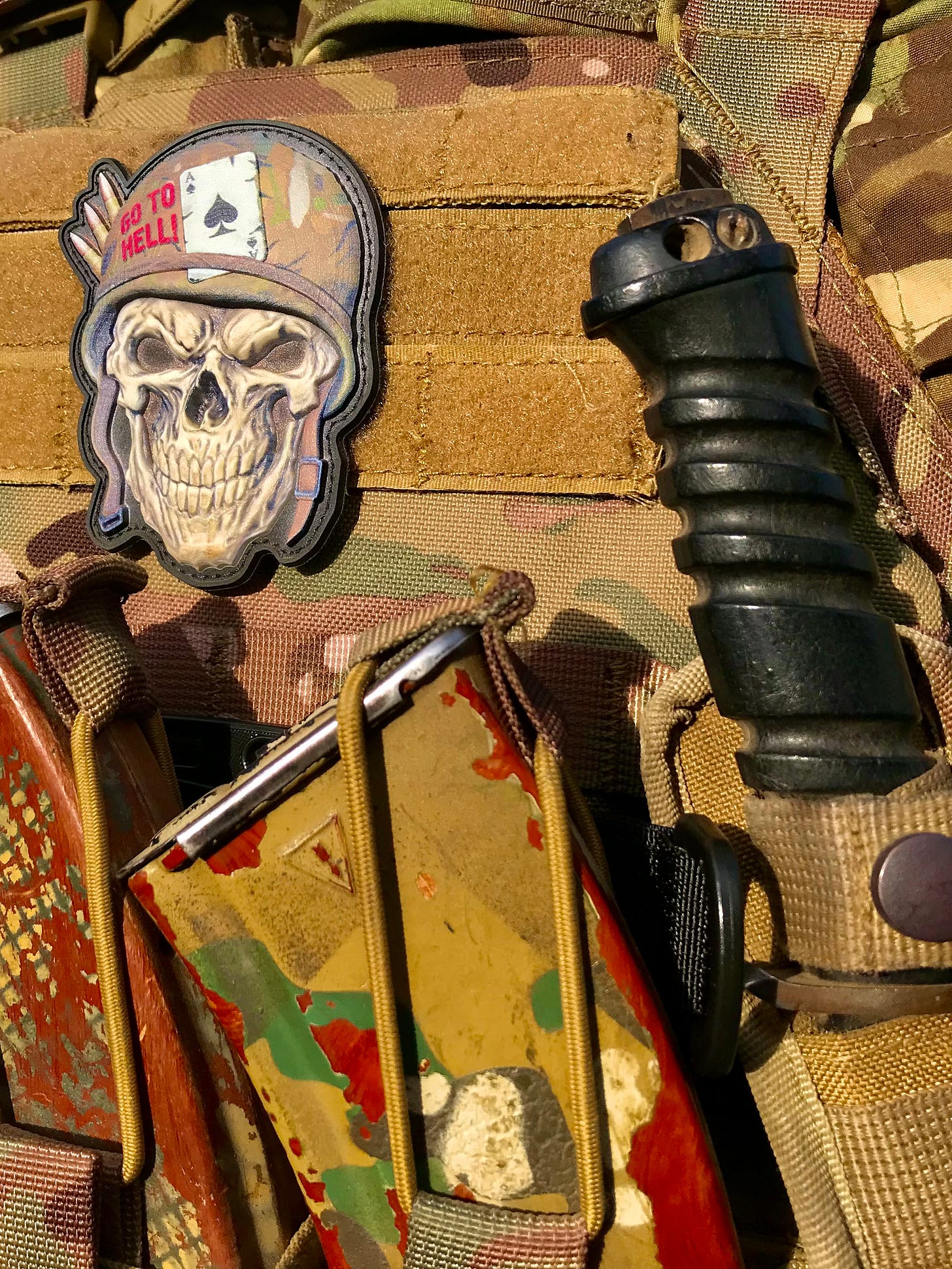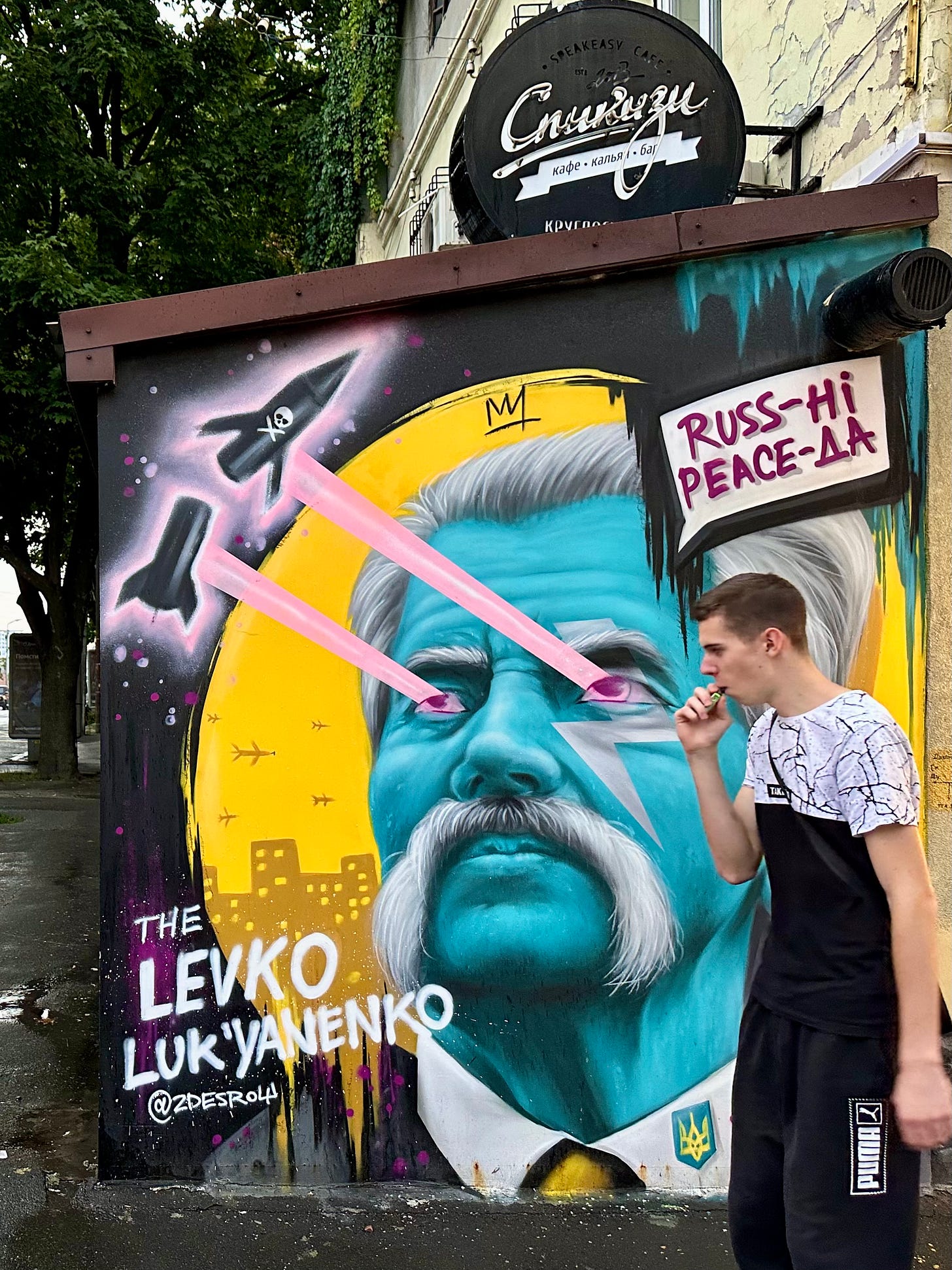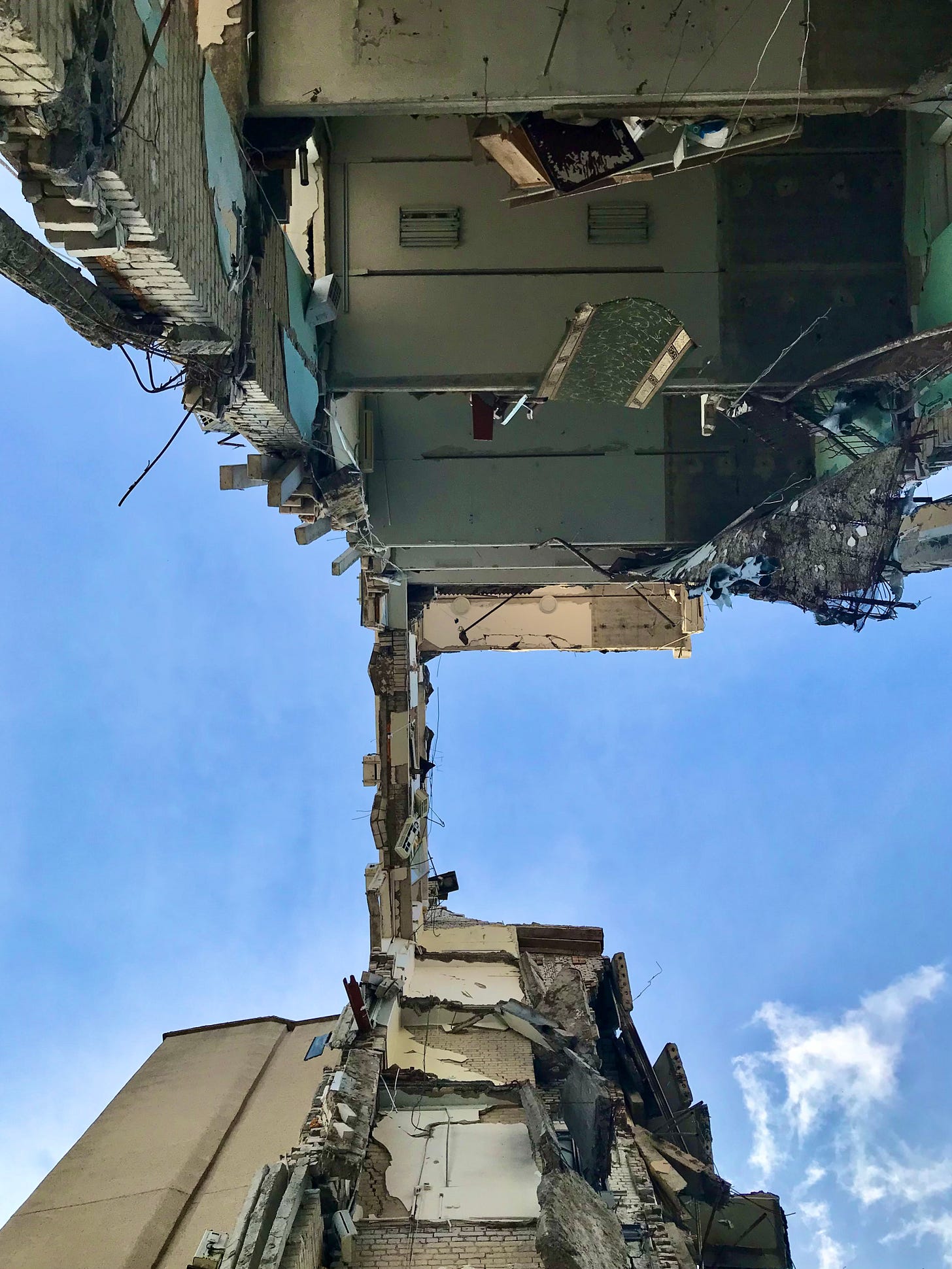Chasing Hale
A father struggles to track down his troubled son in war-torn Ukraine in "Chasing Hale," our latest Fiction feature, by Matt Gallagher.
“Hale? Who is Hale?”
The bartender told Jacob that she hadn’t seen Hale, that besides, the description he’d given her matched hundreds of foreign men in the city. Then she said he needed to order or step out of line. He felt his face crumple a bit. It had been a long day getting here. This place was his only lead, provided by a short Reddit conversation he’d found online. Then the bartender took something like pity on him.
“We are more for press and volunteers,” she said. Her voice was colorless and her accent thick and clumpy, at least in Jacob’s ears. “The fighters go elsewhere.” Then she drew a map on a napkin to an Irish pub deep in the Podil district. If she heard Jacob’s appreciation, she made no sign of it, turning to pour shots of rum for the group behind him. Jacob shuffled out of the way. An attempt at repeating himself strangled out in the folds of his throat.
“You’re Fay’s camera guy, right?” A young man with eyes far too sour for his bare face looked over from the line. “Kharkiv was some crazy shit.”
Jacob didn’t bother with a response. He’d never held a TV camera in his life and couldn’t have pointed to Kharkiv on a globe with a gun to his temple. He’d been in Ukraine all of nine hours and was feeling every day of his fifty-four years surrounded by drunk child journos with mean ambitions. He walked to the stairs, the vibrant percussions of the band on stage following him upward.
Strange place for salsa music, he thought, but what the hell. It made about as much sense as anything else. All wars were the same in this way. They attracted freaks and goons and lost souls like bugs to a picnic, and only a newly-arrived freak could ever see it straight. Jacob hadn’t felt new in a long time. What had been the name of that hotel in Erbil? There’d been a swimming pool in the basement and plates of toasted English muffins in the morning and an honest to Christ sword-swallower who performed at Saturday dinners. People stateside always looked at him crazy when he talked about English muffins in Iraq, but what did they know about the world?
Jacob held little regard for civilians. They weren’t like him. He wasn’t like them. He’d stopped thinking he could be around the time he’d stopped feeling new.
He followed the napkin’s directions through Kyiv. He passed a military recruiting poster marked in Ukrainian script, then a mural with doves flying over barren ruins. The air was wet and dark and the sidewalks steep and clean. Jacob admired neatness in a foreign country. It was a rare thing, he thought. Even America no longer valued it the way he thought it should.
As with anywhere, the people of the city maintained a pattern to their steps. They were hurried here, decided. Jacob fell into it with simulative grace. He hadn’t spent decades in procurement without learning how to recognize local rhythms. A shabby peacoat, dark slacks, and off-brand dress boots he’d found in an Abu Dhabi bazaar conveyed he could be anyone, from anywhere. Any big-shouldered, middle-aged white man from anywhere, at least. He was surprised at how many others weren’t even trying. Along every avenue, on every corner, he saw olive-drab puffer jackets, snapback camo hats and worn, desert-tan boots that all but shouted Western military veteran, please clap.
Fucking kids, Jacob thought. They all want to look like operators now.
He paused under a streetlight to square the napkin with Google Maps. The robot in his phone recommended a nearby monument to Afghanistan veterans. Hey now, Jacob thought in response, I wasn’t Red Army. Still, he might explore the thing the next morning. A smile reached his lips as he imagined the ironies of someone like him paying homage there. Well, why not? They’d had a shared enemy. And a shared defeat. One of Jacob’s guilty pleasures these days was reading articles about the Taliban grunts struggling with the drudgery of city administration in Kabul. Turned out, fighting an empire was easier than regular life.
The Irish pub lay exactly where the napkin said it would. He took a stool at the bar and looked around under hooded eyes. It was half-full, less crowded than the first place had been, heavy traces of sweat and testosterone coursing the dim air. A Brit with bloated cheeks and a stub of an arm was sermonizing at a booth about the international legion’s advances at the front. The audience of youngish, bearded men holding pint glasses was rapt, Jacob saw, though one in the corner with a subdued American-flag ballcap watched him watching them. Jacob watched back until the other man glanced away. The old paranoia, he thought. Everyone wary that everyone else wasn’t who they suggested; everyone not-so-secretly thrilled by the same prospect.
Jacob understood. He’d stuck around the fringes of war, become a defense professional, for the same huffs of purpose. Turned out, fighting for empire was easier than regular life too.
He shifted his body and focus from the booth toward the bar, waiting for someone to come take his order. His eyes found a display case mounted to the wall next to a cheap pendulum clock of a black cat with a wagging tail. Various velcro patches and emblems filled the display—most with symbols he didn’t recognize and figured Ukrainian, and a few that he did, Royal Marines and French Foreign Legion and the Screaming Eagle insignia of the 101st Airborne. In the top left corner of the display case stretched a nametape. It was American, MultiCam pattern, the kind soldiers had worn in Afghanistan from the surge there a decade past all the way through the withdrawal. Blocky, all-caps letters spelled out the nametape’s owner, and Jacob felt his blood turn alpine.
“Did Joey give you that?” A bartender had neared. Jacob attempted no caution. “Do you know? Is Joey here?”
He flitted his attention from the “HALE” nametape in the display to the person who should be asking if he preferred stout or whiskey. It was a woman, tall, stocky, mid-twenties or so, with angled black bangs and a messy chignon. She crossed her arms, scrutinizing Jacob as if he were more nemesis than nuisance. A tattoo of a clenched fist splayed across the side of her neck, gleaming in bright, fresh ink.
“Joey has not been here for some months,” she finally said, her words careful, deliberate. “If you locate him, I would very much like to know.”
He peered over the bar top. He was half-expecting a belly bump, but firm abs instead emerged under a cropped sweater. He returned to the woman’s face and watched her watch him. She had grabbed a tumbler glass and sipped an amber-brown liquid from it. Something approaching recognition was reaching her glare.
Not pregnant, Jacob thought. That’s good. That’s one thing my son hasn’t done wrong over here. For the first time in weeks, a little relief brushed over him.
*
In 2017, the satirical website The Onion published an article about Jacob’s war. “Soldier Excited To Take Over Father’s Old Afghanistan Patrol Route,” the headline read. Jacob laughed when he first saw it. Then a couple dozen people texted or emailed him the same article over the course of the next month. He considered it less funny each time.
Jacob found himself remembering that article and his various responses to it a half-decade later in a café many miles and hours west of Kabul. He’d spent a tour there early enough in the war that they’d thought it was nearing an end. He’d been what they called a pogue, an enlisted supply chief far better at the logistics of bullets than the shooting of them. He’d slogged through twenty-two years of service to earn a retirement check and the right credentials to join most any mid-sized defense contractor the world over. He’d had a plan and he’d held to it, even as life in the green machine cost him a marriage, a functional shoulder, and interest in normal civilian matters like movies or sports.
Joey, his only child, his pride and joy, his little clone, proved a different type of soldier. Brawny and driven, Joey had made it as a trigger-puller to Bravo Company, 3rd Battalion of the fabled 75th Ranger Regiment, something Jacob suspected was a bit of a middle finger to the career choices of his father. One phone call every Saturday and one week of summer vacation at whatever dustland base he was stationed at was more than Jacob had received, paternally speaking, but Joey “needs more from you,” his ex-wife always chided, and sometimes, Jacob even thought she might’ve been right. One of those instances had been when Joey called him from jail, asking for bail money. Apparently a BAC of 0.21 and telling a highway patrolman “I hope your next blowjob is from a shark” was frowned upon in Georgia. Drummed out of the Rangers, a second DUI and other-than-honorable discharge soon followed.
Jacob knew his son had come to Ukraine in pursuit of a second chance, maybe even redemption. Instead, it seemed Joey had only found more of himself.
Jacob checked his watch again in the café, squinting through a vine of morning sunlight curling through the tableside window. Half past ten; the Ukrainian fixer was fifteen minutes late, which he considered a poor sign. Jacob valued punctuality, not so much because the military had drilled it into him but because business had. You could trust punctual people, Jacob believed. It meant they recognized time was finite and so was money and the lone thing that mattered more than either was breathing. An acquaintance of an acquaintance affiliated with the State Department had passed along a phone number with assurances this “Petro” was legitimate. Something which mattered to Jacob less and less with each larcenous second that went by.
“Mister Hale?”
The voice arrived with a tentative hand on the shoulder. Jacob felt his body spasm. He let his chest settle for a few beats before instructing the young man who’d snuck up on him to sit down.
Petro—who insisted Jacob call him P3, because that’s what the Green Berets had called him at the NATO base at Yavoriv before they’d left the country at the order of President Biden—dressed in the outfit of modish cosmopolitans everywhere, skinny black jeans and a charcoal-gray turtleneck. He was in his late twenties, Jacob thought, no older than Joey, with the same sour eyes of the child journos he’d encountered the night prior. Petro smelled of fruity cologne and kept rubbing at the dark scraggles of his goatee as he listened to Jacob explain what he needed in an interpreter and fixer.
“So I guess P1 and P2 aren’t available?” Jacob had meant it kiddingly, but it was answered in high earnest.
“Negative,” Petro said. “P1 joined the army after the invasion. His unit now fights in Bakhmut. P2?” The young Ukrainian shrugged. “Last I know, his mother was paying a Moldovan gang to smuggle him out.”
Draft dodgers, Jacob thought. Don’t read about them in the Western newspapers. He asked Petro’s rate.
“Two hundred dollars per day. Plus expenses.”
“American?”
Petro nodded.
“Why dollars over hryvnia?”
The Ukrainian sniffed. “Better to be a safe ass than a sorry asshole. The Green Berets teach me this. I have a Labrador puppy at home. I must be a good protector for him.”
It was as fine a response as any. Jacob felt his face bend with assent. He asked the dog’s name.
“Franko. We call him Frank.”
“You named your pup after the Spanish dictator?”
For the first time, Petro allowed himself to frown. Jacob didn’t mind. It was an honest reaction. It made him trust the kid more.
A Kyiv hipster, he thought. Who says soft power ain’t real?
“I don’t actually care.” Jacob interrupted a history tutorial about another Franko, some dead socialist poet. The bartender at the pub had mentioned a medical charity. He asked Petro what contacts he had in that world. They’d begin there.
*
Joey’s Christmases as a boy were spent with his mom, with one exception: in middle school, during a particularly rebellious phase of teenage delirium, she’d fled the continent for a Caribbean vacation with a boyfriend, leaving Jacob the dual responsibilities of warden and Santa Claus. He’d been stationed at Fort Riley and had just undergone the first of four shoulder surgeries for a torn labrum. Which meant that while he’d intended to prepare for a nice domestic holiday with his only child, he’d never gotten around to doing so until a reedy skater kid with blue hair and a new Adam’s apple the size of a billiard ball stepped off the plane and asked what the hell there was to do in freaking Kansas.
Unsure how to answer that, Jacob had driven them to the local Buffalo Wild Wings. Jacob liked their ultimate nachos, and it was known as a place where senior noncoms could congregate and officers and junior enlisted would not. But then he didn’t know how to speak to his son. None of the old talking points landed. For his part, Joey seemed to have no interest in even trying. Jacob was dreading bringing the boy home to a bedroom with bare walls, a mattress on the floor, and Ninja Turtles sheets he’d found in storage. He’d ordered a second and third Bud Heavy in quick succession. Meanwhile, Joey got bored and started flinging coasters at a nearby booth to try and get a girl’s notice.
“Stop it. That’s the Sergeant Major.” Jacob had flashed the Sergeant Major and his family a taut grin before promising his son forty dollars if he’d behave. When he reached for his wallet, though, a loud crack sounded from his freshly-repaired shoulder. A thunderbolt of blinding pain followed. He’d removed his sling that morning, weeks early, to not look feeble in front of his boy.
“Shit, Dad. You okay?” Joey’s voice cracked about as much as Jacob’s shoulder had. Jacob swallowed away his wincing, best he could, and pulled out the two twenties.
“How’d that happen?” For the first time since arriving, Joey appeared attentive, engaged, even interested in something to do with his father’s life. “The war?”
They’d never before discussed Afghanistan, not in any substance. Which had suited Jacob fine, because he hadn’t had much to say. Pogues did not leave the large bases. Pogues did not come home with war stories. But as a teenager with a mercurial air stared at him with his own face, his own hooded contemplation, he knew telling the truth—that he’d hurt himself unloading frozen pork riblets for the dining facility at the Fort Riley airfield—would not suffice. This was a moment to connect. This was a moment to bond. This was a moment for outright lying.
He’d nodded, solemn as a zealot.
“I was one of the lucky ones,” he’d said.
Had it been worth it? Jacob wondered, some fifteen years later, in a rental car pushing south from Kyiv, more than half-a-world away from that Buffalo Wild Wings that almost definitely still hosted awkward conversation between senior noncoms and their visiting offspring. Had it been worth the ten minutes of respect and awe, tricking Joey into thinking his old man was something more than he was?
Something cold and clawing twisted in his chest.
Yes, he thought. Crazy thing is, it had been.
Keep reading with a 7-day free trial
Subscribe to Consequence to keep reading this post and get 7 days of free access to the full post archives.




